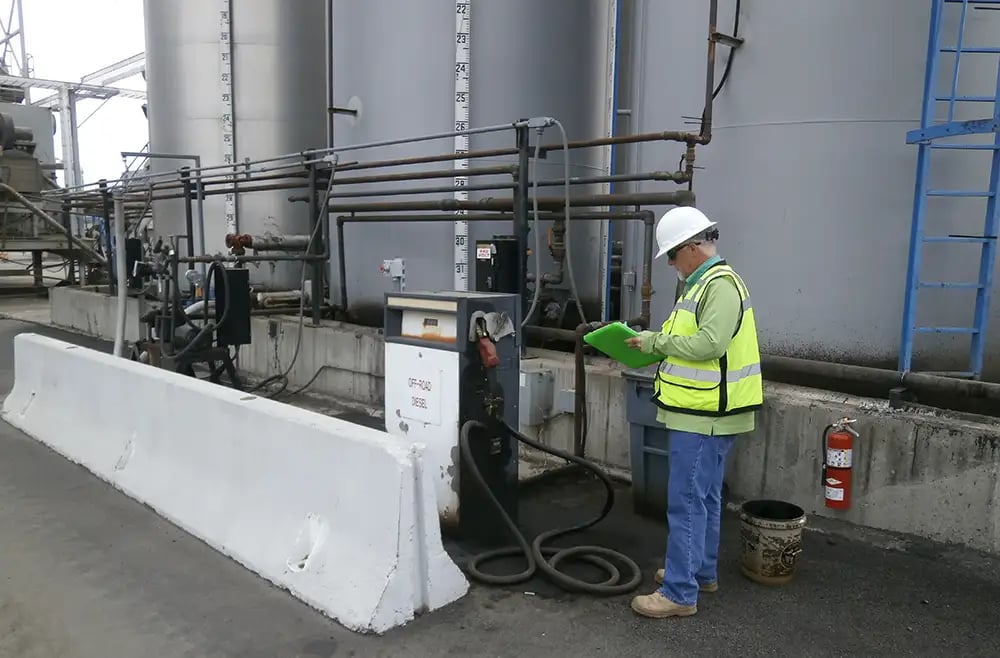Learn how air quality permits and regulations impact your asphalt plant.
It can be frustrating and confusing to learn that your asphalt plant needs an air permit. After all, you’ve probably already gone through the hassle of getting construction permits, stormwater permits, SPCC Plans, and jumped through other regulatory hoops to get up and running.
If you’re just learning that you need an air permit for your asphalt plant, regardless of whether it’s been in operation for years, or hasn’t produced yet, don’t stress! We’ve been to more asphalt plants across the US than we can count, and have assisted many folks with air permit applications, ongoing compliance assistance, and even environmental training. We know this stuff can be overwhelming, so we’ll break down air permits at asphalt plants in this quick read – so you can get back to the important stuff!

Do asphalt plants need an air permit?
We already hinted at this, but yes! In pretty much every state in the US, any hot mix asphalt production facility will require an air permit to operate. Why? Well, asphalt plants tend to put out a decent chunk of emissions (in layman’s terms, air pollution!), so most are required to have an air permit across the United States. Think of an air permit as a license to release a certain amount of air pollution.
How much will an air permit for an asphalt plant cost?
It depends! Different permitting agencies will charge different fees, so the cost of an air permit for an asphalt plant is mostly dependent on the state, county, and/or city where your asphalt plant is located. Some will charge additional expenses for each piece of equipment (which can add up quickly), while others will allow the entire plant and all of its equipment to be permitted as one unit.
Since air permits (generally) come from a state or regional level government agency, the cost for an air permit at an asphalt plant can vary based on the regulations from state to state, and even county to county or city to city within a single state. Confusing, right? So again, the cost of an air permit at an asphalt plant all depends!
Having said that, air permits for asphalt plants aren’t the cheapest type of air permits, but they also aren’t the most expensive. Though a ballpark number is difficult to give, we’d say you should expect to pay your permitting agency anywhere from $2,500 - $50,000. This really is a huge contrast in price, but there are a lot of factors that can significantly impact the cost of permitting your operation. Here are a couple of factors that will impact the price you’ll pay for an air permit at your asphalt plant:

How does your permitting agency charge for each piece of equipment?
We touched on this one already, but obviously, you’ll save a lot of money if you can permit the whole plant as one unit, and you’ll spend a lot more if you need to pay for each individual piece of equipment. Some types of permits across the country will let you do this, others won’t, it all depends on where your asphalt plant is located.
Does your application need to go through Refined Risk Screening for toxic air pollutants?
This happens when your permitting agency needs to take a closer look at the number of pollutants you’re going to be releasing. If you need Refined Risk Screening, you’re going to be the one to foot the bill. Again, some asphalt plants will need to go through this as part of the air permitting process, others won’t. It all depends.
Does your application need to go through Air Dispersion Modeling?
Similar to the last example, this is when your permitting agency needs to take a look at where the pollutants you plan to release will end up. Will they be released high into the air and dispersed 100 feet over an industrial park? Or will they hover around a nearby elementary school? It makes a very big difference! Again, if you need Air Dispersion Modeling, you can expect to pay more for an air permit at your asphalt plant.
What will I need to do once I get my asphalt plant air permit?
Again, it’s going to depend on your permitting agency (based on your location) and the particular permit that you end up with. The only way to really be sure is to read through your permit!
Fortunately, air permitting requirements for asphalt plants tend to be pretty similar across the United States. Most requirements can be broken down into one of three categories: recordkeeping, monitoring, and testing. Here’s a closer look at each:
- Recordkeeping Requirements: This category is usually the most to keep up with the day-to-day at your asphalt plant. You can expect to keep track of things like fuel usage, asphalt production rates, slag and RAP usage, and more, all various things that could impact the emissions from your asphalt plant.
- Monitoring Requirements: This category is similar to recordkeeping but is more like an inspection schedule. For example, many air permits require regular baghouse inspections to make sure that everything is working properly.
- Testing Requirements: This category includes things that you may not be able to do yourself. A common requirement is stack testing, which measures the actual amount of pollutants that you release. In fact, there’s a federal policy called New Source Performance Standards (NSPS) for Hot Mix Asphalt Facilities, that says every asphalt plant in the United States is required to conduct an initial stack test within 60 days of maximum production of the plant, but no later than 180 days after startup. Some agencies will require this just once at the beginning of your asphalt plant’s operation, while others will require it on some regular basis, such as every 5 years, or even annually!
Remember, this isn’t an all-inclusive list. The only way to truly know what you’ll need to do to keep up with your air permit is to read your permit!

How do I get an air permit for my asphalt operation?
You’re probably getting tired of this answer, but it again depends on where you’re located. An air permit application for a hot mix asphalt production facility is generally going to be a large and detailed technical application, but they do tend to vary from location to location. As a general rule of thumb, here are the things that are most likely to be required for an asphalt plant air permit application:
- A listing of equipment to be permitted, including dates of construction, model years, maximum production rates, hours of operation, operational limits, etc.
- Calculation of potential emissions for all operations both before and after the use of various controls.
- A review of hazardous air pollutants and toxic air pollutants in relation to local environmental and human health risk assessment/screening.
- Completion of state-specific/county-specific forms as required by the application.
Again, this is going to vary from location to location, but most asphalt plant air permit applications have one thing in common: they’re pretty complicated! The silver lining? You don’t have to do it alone! While this sounds hard and complicated, it doesn’t have to be difficult.
We make the analogy that getting an air permit (and really, dealing with any type of environmental regulation) is like doing your taxes. For some, it’s an easy task to accomplish on your own. For others, you really should hire an expert to make sure things are done correctly and you won’t get in trouble!

What types of equipment are typically permitted on an air permit for an asphalt plant?
Here’s where things can get technical. Some states may break the equipment down as either significant or insignificant activities. It’s very important to distinguish between these types of equipment, as well as to know whether you should list your equipment as an aggregate sum or to break them down individually as units. This is relevant because it could have a large impact on the type of permit you’ll need, your permit application, fees, etc.
For example, some states may allow you to permit all of the conveyors as an asphalt plant whereas others may mandate you list each conveyor individually. However, if you do this when it’s not necessary, you may end up with numerous permits and considerably higher costs. This same rationale can be applied to all types of equipment.
The details of your state and/or regional air permitting considerations will (again) depend on where your facility is located, the type of equipment needing to be permitted, and how you can most efficiently and correctly permit your asphalt plant. As you can see, permitting can be confusing right out of the gate!
What actually needs to get permitted, or may be covered under a permit? Again, it all depends. Here are a few of the more common pieces of equipment that may need air permit coverage:
- Drum Dryers & Mixers
- Baghouse & Conveyors
- Asphalt Storage Silos & Tanks
- Crushing and Screening Unit
- Hot Oil Heaters
- And more!

Get Air Permitting Help at Your Asphalt Plant
If you’re just learning that your asphalt plant needs an air permit and don’t want to deal with the headaches that come along with a complicated application process, reach out to us, and we can help get you squared away, into compliance, and help keep you out of trouble. Whether you’re getting your facility correctly permitted right out of the gate, or getting an existing operation into environmental compliance, we’ve helped asphalt plants across the country get air permits and would be happy to take the weight off of your shoulders.
To learn how we can help your asphalt plant get into compliance with air permits (or any other area of environmental regulations) and stay out of trouble, either click here to contact us, call us anytime at 888-RMA-0230, or shoot us an email at info@rmagreen.com to talk.
Additional Information on Asphalt Plants

















